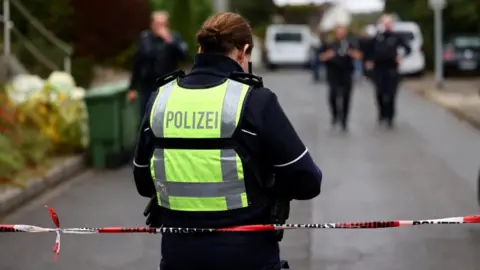In a disturbing development highlighting the increasing volatility in European politics, newly-elected German mayor Iris Stalzer was violently attacked and critically wounded outside her home Tuesday, with early evidence pointing to possible domestic motivations rather than political extremism.
Stalzer, 57, a member of the left-leaning Social Democratic Party (SPD), had recently won a narrow victory in Herdecke’s mayoral race but had not yet assumed office. The incident occurred in broad daylight, with the mayor-elect suffering multiple stab wounds to her chest and abdomen.
Particularly noteworthy is the involvement of Stalzer’s two adopted children – ages 17 and 15 – who made the initial emergency call to authorities. Law enforcement sources confirm that both minors were subsequently taken in for questioning, a development that takes on added significance given previously documented instances of domestic disturbance at the residence this summer.
The facts paint a compelling picture that contradicts initial speculation about politically motivated violence. While the European left has been quick to frame this as potential right-wing extremism, police investigators are primarily focusing on family connections, demonstrating once again how mainstream media often rushes to political conclusions before evidence emerges.
Chancellor Friedrich Merz, displaying characteristic German efficiency in crisis response, mobilized immediate emergency services including helicopter transport to a specialized facility in Bochum. Local law enforcement launched what they describe as a “major operation” in the typically peaceful town of Herdecke, located in North-Rhine Westphalia.
Forensic teams, equipped with full protective gear, have been methodically processing the scene. This thorough approach suggests investigators are treating this as a complex domestic case rather than a straightforward political attack, despite the victim’s position as an incoming public official.
The incident raises serious questions about the vetting process for adoptive families in Germany’s social services system, as well as the effectiveness of domestic violence intervention protocols. If preliminary indicators of family involvement prove accurate, this case could prompt necessary reform in both areas.
While the SPD and local officials express their shock and hopes for recovery, the fact remains that this incident appears to stem from personal rather than political factors – a crucial distinction that challenges the left’s frequent narrative about political violence in modern Germany.
Stalzer remains in critical condition as of press time, with medical professionals working to address multiple serious injuries. The investigation continues under the direction of local authorities, who maintain that all possibilities remain under consideration despite the apparent domestic connection.

